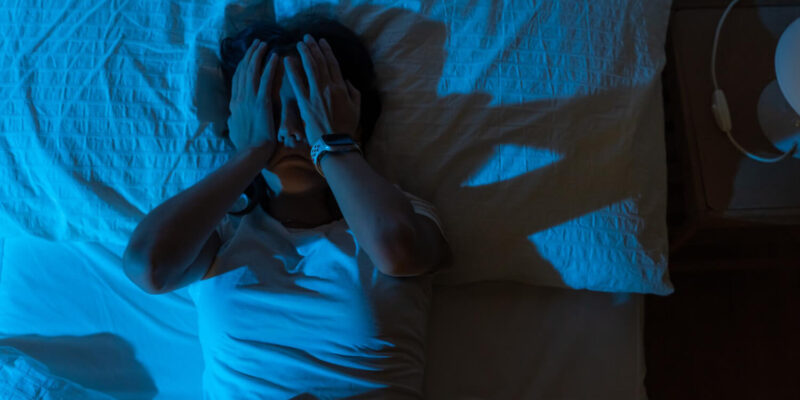Have you ever crawled into bed after a long and tiring day, only to find yourself tossing and turning for hours? You’re not alone. Many people experience nights where they can’t sleep, even when they feel exhausted. In this article, we will delve into the factors that contribute to these frustrating sleepless nights.
The Science Behind Sleep and Tiredness
Sleep is a complex process regulated by our body’s internal clock, or circadian rhythm. This rhythm affects various physiological processes, including body temperature, hormone secretion, and alertness levels. Multiple factors can disrupt your circadian rhythm and make it difficult for you to fall asleep, even when you feel tired.
External Factors Affecting Sleep
Several external factors can negatively impact your ability to fall asleep at night. These include:
- Exposure to blue light: Electronic devices like smartphones, laptops, and TVs emit blue light, which can suppress the production of melatonin – the hormone responsible for inducing sleepiness. Using electronic devices before bedtime can thus make it harder for you to fall asleep.
- Irregular sleep schedule: Going to bed and waking up at different times each day can confuse your body’s internal clock, making it difficult for you to fall asleep when needed.
- Environmental factors: A noisy, bright, or uncomfortable sleeping environment can interfere with your ability to fall asleep.
- Caffeine and alcohol consumption: Consuming caffeine or alcohol close to bedtime can disrupt your sleep cycle and prevent you from falling asleep quickly.
Internal Factors Affecting Sleep
Besides external factors, various internal factors can also contribute to difficulty falling asleep. These include:
- Stress and anxiety: An overactive mind filled with worry and stress can make it challenging to relax and fall asleep at night.
- Depression: Depression can lead to disrupted sleep patterns, including difficulty falling asleep or staying asleep throughout the night.
- Sleep disorders: Conditions such as insomnia, restless leg syndrome, and sleep apnea can make it difficult to fall asleep or maintain quality sleep throughout the night.
- Napping during the day: Taking long naps during the day can disrupt your sleep cycle and make it harder for you to fall asleep at night.
Finding Solutions to Sleepless Nights
In order to improve your ability to fall asleep, even when tired, it’s crucial to identify and address the factors that may be contributing to your sleep difficulties. This may involve making changes to your lifestyle, habits, and environment.
Creating a Sleep-Friendly Environment
Ensuring your sleeping environment is conducive to restful sleep can make a significant difference in your ability to fall asleep at night. Consider the following adjustments:
- Keep your bedroom cool, dark, and quiet by using blackout curtains, earplugs, or a white noise machine.
- Invest in a comfortable mattress and pillows that suit your personal preferences and sleep needs.
- Limit exposure to electronic devices before bedtime and use blue light filters on screens.
Establishing a Sleep Routine
Maintaining a consistent sleep schedule can help regulate your body clock and make it easier to fall asleep when you’re tired. To establish a routine:
- Go to bed and wake up at the same time each day, even on weekends.
- Create a relaxing bedtime routine, including activities such as reading a book, taking a warm bath, or practicing relaxation techniques like deep breathing or meditation.
- Avoid caffeine and alcohol close to bedtime, as these substances can disrupt your sleep cycle.
- Limit daytime naps to no more than 20-30 minutes to avoid negatively impacting your nighttime sleep.
Managing Stress and Anxiety
If stress and anxiety are interfering with your ability to fall asleep, consider implementing strategies to better manage these feelings. Some effective methods include:
- Engaging in regular physical activity, which has been shown to reduce stress levels and improve overall sleep quality.
- Utilizing relaxation techniques, such as deep breathing exercises, progressive muscle relaxation, or mindfulness meditation, to help calm an overactive mind.
- Seeking professional help from a therapist or counselor if you’re struggling to manage stress and anxiety independently.
When to Consult a Healthcare Professional
In some cases, difficulty falling asleep can be a sign of an underlying medical condition or sleep disorder. If you’ve tried various sleep-improvement strategies without success, it may be beneficial to consult with a healthcare professional. They can help diagnose any potential issues and recommend appropriate treatment options to resolve your sleep difficulties and help you get the restful night’s sleep you deserve.



Comments